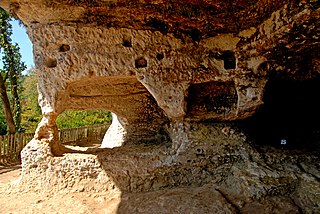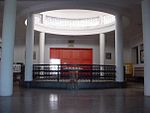
Historic preservation (US), built heritage preservation or built heritage conservation (UK) is an endeavor that seeks to preserve, conserve and protect buildings, objects, landscapes or other artifacts of historical significance. It is a philosophical concept that became popular in the twentieth century, which maintains that cities as products of centuries' development should be obligated to protect their patrimonial legacy. The term refers specifically to the preservation of the built environment, and not to preservation of, for example, primeval forests or wilderness.

The Ministry of Culture is the ministry of the Government of France in charge of national museums and the monuments historiques. Its goal is to maintain the French identity through the promotion and protection of the arts on national soil and abroad. Its budget is mainly dedicated to the management of the Archives Nationales and the regional Maisons de la culture.

Monument historique is a designation given to some national heritage sites in France. It may also refer to the state procedure in France by which national heritage protection is extended to a building, a specific part of a building, a collection of buildings, a garden, a bridge, or other structure, because of their importance to France's architectural and historical cultural heritage. Both public and privately owned structures may be listed in this way, as well as movable objects. As of 2012, there were 44,236 monuments listed.

Koutammakou, the Land of the Batammariba is a cultural landscape designated in 2004 as a UNESCO World Heritage Site at the border between northern Togo and Benin. The area features traditional mud tower-houses which remain the preferred style of living. The traditional mud houses are known as a national symbol of Togo. Many of the mud houses have two floors and some of them have a flat roof.

The Maison Saint-Gabriel Museum is located in Montreal, Quebec and is dedicated to preserving the history, heritage and artifacts of the settlers of New France in the mid 17th century. The museum consists of a small farm, which has been administered for more than 300 years by the Sisters of the Congregation of Notre Dame of Montreal, founded by Marguerite Bourgeoys in Montreal in 1658.

The Hôtel de Sully is a Louis XIII style hôtel particulier, or private mansion, located at 62 rue Saint-Antoine in the Marais, IV arrondissement, Paris, France. Built at the beginning of the 17th century, it is nowadays the seat of the Centre des Monuments Nationaux, the French national organization responsible for national heritage sites. It has been listed since 1862 as a monument historique by the French Ministry of Culture.

The archaeological site Abri de la Madeleine is a rock shelter under an overhanging cliff situated near Tursac, in the Dordogne département of the Aquitaine région of southwestern France. It represents the type site of the Magdalenian culture of the Upper Paleolithic. The shelter was also occupied during the Middle Ages. The medieval castle of Petit Marsac stands on the top of the cliff just above the shelter.

Félix-Alexandre Desruelles was a French sculptor who was born in Valenciennes in 1865. He was runner up for the Prix de Rome in 1891, won the Prix national des Salons in 1897 and a Gold Medal at l'Exposition Universelle in 1900. He died in La Flèche in 1943. He was a member of the Institut de France and of the Académie des Beaux-Arts.

Edgar Boutry (1857–1938) was a French sculptor who executed several public statues and monuments and worked on several Monuments aux Morts. He also ran the Écoles académiques lilloises.
The Quebec Cultural Heritage Directory is an online cultural heritage knowledge dissemination tool for the province of Quebec. The directory is maintained by the province's Ministry of Culture and Communications.

The Libyco-Punic Mausoleum of Dougga is an ancient mausoleum located in Dougga, Tunisia. It is one of three examples of the royal architecture of Numidia, which is in a good state of preservation and dates to the second century BC. It was restored by the government of French Tunisia between 1908 and 1910.
Louis Chatelain was a 20th-century French historian, archaeologist and university professor. The son of Émile Chatelain, philologist and Latinist, he particularly worked on the excavation sites of Orange, Maktar (Tunisia) and Volubilis (Morocco).
Liliane Ennabli is a Franco-Tunisian historian, archaeologist and epigrapher, a specialist in the history of the Christian period of the archaeological site of Carthage.
Euripide Foundoukidis was a Greek administrator at the International Institute of Intellectual Cooperation (IIIC) who ran the International Office of Museums (IOM) for many years.
The Maison de la Culture de Firminy is a cultural establishment located in Firminy in the Loire region of France. The site was inscribed on the UNESCO World Heritage List in 2016 for its contribution to the development of modern architecture along with sixteen other works by Le Corbusier.

Bab el-Khemis is a historical city gate in the west of the old town (medina) of Meknes, Morocco.
The Base Palissy is the database of French movable heritage, created and maintained by the French Ministry of Culture. It was created in 1989, and placed online in 2002. The database is periodically updated, and contains more than 515,000 entries as of October 2020. It covers several types of objects: stained glass, paintings, sculptures, religious and civil objects, scientific collections and industrial heritage. Many, but not all of the described objects are also listed as historical monuments. The database was named after 16th century potter and writer Bernard Palissy. In 2005, the Palissy database contained some 280,000 records, including 170,000 for the Inventory and 110,000 for historic monuments. 25,000 entries are illustrated by the Mémoire database. 5,000 complete documentary files are associated with the records.























